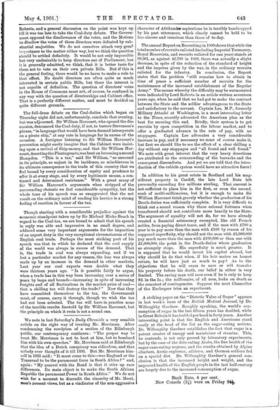Though starting with a considerable prejudice against the economic standpoint
taken up by Sir Michael Hicks-Beach in regard to the Coal-tax, we are bound to admit that his speech in reply was able and impressive in no small degree, and adduced some very important arguments for the imposition of an export duty in the very exceptional circumstances of the English coal trade. Perhaps the most striking part of his speech was that in which he declared that the coal supply of the world was always in excess of the demand. That is, the trade in coal was always expanding, and if we lost a particular market for any reason, the loss was always made up by an increase in the demand in other markets. Last year our coal exports were double what they were thirteen years ago. " Is it possible fairly to argue, when a trade has in this way been increasing over a series of years by leaps and bounds—increasing in spite of increasing freights and of all fluctuations in the market price of coal— that a shilling tax will destroy the trade ? " Now that they have committed themselves to the tax, the Government must, of course, carry it through, though we wish the tax had rot been selected. The tax will have in practice none of the terrible results foretold by Sir William Harcourt, but the principle on which it rests is not a sound one.










































 Previous page
Previous page